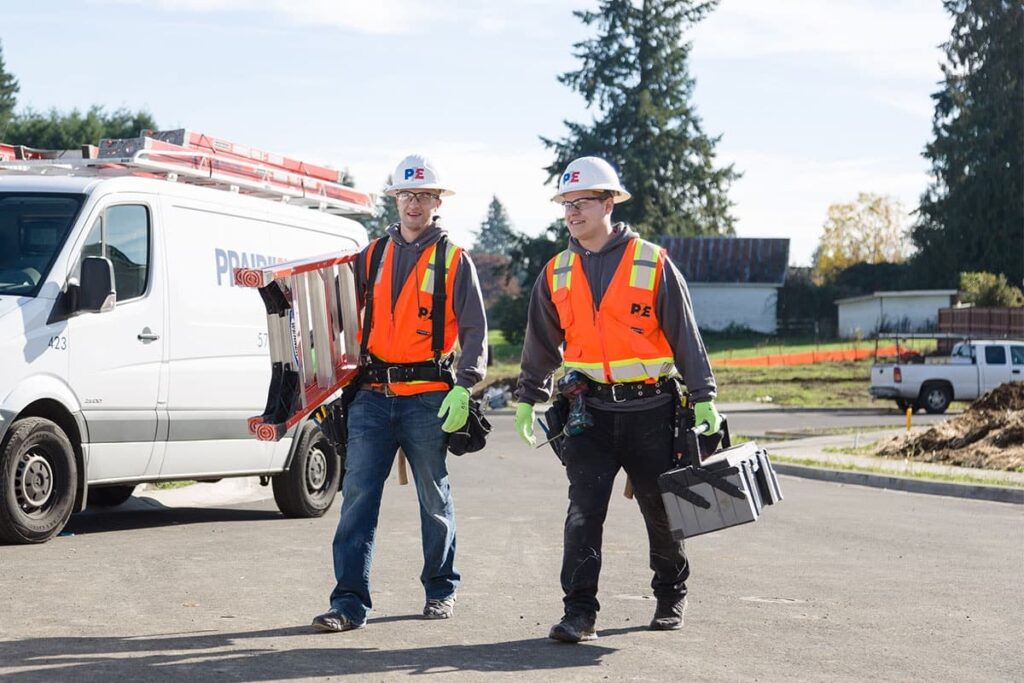Electricity powers our modern lives, yet the profession that keeps it running smoothly often remains in the shadows. Have you ever considered becoming an electrician? Here’s why you should, and why joining Prairie Electric’s team in Oregon and Washington State could be the right move for you.
A Rich History of Success
The electrical field has a surprising history of attracting brilliant individuals who went on to make their mark on the world stage. Before becoming the King of Rock ‘n’ Roll, Elvis Presley trained as an electrician. George Harrison, before joining The Beatles, was an electrician’s apprentice. Even the renowned British comedian, Mr. Bean (Rowan Atkinson), holds a Masters degree in Electrical Engineering from Queen’s College, Oxford. The field has served as a launchpad for many successful careers.
Physical Fitness and Job Security
Basic physical fitness is essential for electricians, who must climb ladders, lift heavy equipment, move through small spaces, and work in all weather conditions. Despite the physical demands, electricians enjoy excellent job security, with strong career growth and opportunities for advancement.
Specialization and Versatility
Electricians can specialize in four different fields: residential, commercial, industrial, or substation/transformer work. Prairie Electric’s team includes specialists in all these areas, offering a diverse range of opportunities within the electrical field.
Debt-Free Education
Pursuing a career as an electrician offers a debt-free education. Prairie Electric provides paid training for apprentices, allowing them to learn on the job and earn wages simultaneously. This is a significant advantage over traditional college education, which often leaves graduates burdened with student debt.
Job Outlook and Salary
The demand for electricians is expected to grow significantly, especially with the increasing popularity of planet-friendly energy resources like wind and solar power. Electricians earn good salaries, with median incomes around $60,000 per year in 2022, and even higher in regions like Oregon and Washington State.
Automation Resistance
Unlike many industries facing automation, electricians are relatively safe due to the individualized and high-quality nature of their work. Robots cannot match the expertise and precision of a skilled electrician, ensuring continued demand for human workers in the field.
How to Get Started
Becoming a licensed electrician requires completing an apprenticeship program, which typically lasts four years. During this time, apprentices receive on-the-job training and attend classroom instruction to learn the necessary skills and knowledge. Prairie Electric partners with the Northwest Institute of Electrical Technology JATC Area 1 to administer their apprenticeship program, providing apprentices with 8,000 hours of on-the-job training and 576 hours of classroom instruction. Apprentices also receive semi-annual wage increases based on their progression in the program.
Career Opportunities at Prairie Electric
Prairie Electric is currently seeking qualified electricians to join their team. We offer great benefits such as full medical and dental insurance, paid vacations, holidays, and a 401K plan. Working at Prairie Electric provides a rewarding career with a supportive work environment and opportunities for growth and advancement.
The Benefits of Skilled Trades
Skilled trades like electrical work offer high salaries, great benefits, and room for career growth without the burden of student debt. It’s a practical and rewarding career choice for those interested in working with their hands and making a tangible impact on their communities.
Become an Electrician
If you’re ready to start a new career as an electrician, consider applying to Prairie Electric. We provide the training, support, and benefits you need to succeed in this dynamic field. Join Prairie Electric’s team and embark on a rewarding career in the electrical industry!




